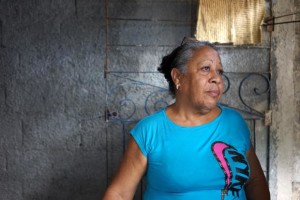Cuban family reveals complex reaction to Castro death

Nancy Belcourt looks out from her porch in Santa Clara, Cuba, Wednesday, Nov. 30, 2016. Fidel Castro’s death unleashed powerful public emotions in Cuba. Belcourt revealed a blend of gratitude to Castro’s revolution, pain at the violence it unleashed and hope that Cuba will now be able to start looking toward a future that builds on Castro’s legacy while living its worst aspects behind. Photo by CHRISTINE ARMARIO/AP
SANTA CLARA, Cuba — When Nancy Belcourt was a girl, two of her uncles fled their home in the central Cuban countryside to join rebels fighting a counter-revolution against Fidel Castro.
One was shot to death by firing squad, his bones found by Belcourt’s family many years later. Another was shot and killed while fighting Castro’s men in the Escambray mountains in 1963. Belcourt remembers his frozen remains arriving in a wooden box, water from the slowly melting body dripping onto the floor.
“I’m 60 years old,” she said. “I’ve never forgotten that water.”
Her father never forgave Castro for the killings of his two brothers but when Nancy Belcourt’s neighbor told her Friday that Fidel Castro was dead, there was only a tiny sense of surprise and then wonder: What next?
Castro’s death unleashed powerful public emotions in Cubans on the island and in exile around the world. In Cuba there have been five days of revolutionary fervor, with hundreds of thousands of people singing Castro’s praises and pledging their commitment to his socialist system.
Article continues after this advertisementBut behind closed doors, feelings have been more complex. A day spent with Belcourt revealed one person’s blend of gratitude to Castro’s revolution, pain at the violence it unleashed and hope that Cuba will now be able to start looking toward a future that builds on Castro’s legacy while leaving its darker side behind.
Article continues after this advertisement“People feel hopeful,” she said, sitting on a bed in a concrete-walled room in her home in the outskirts of Santa Clara, where Castro’s ashes arrived Wednesday, the first stop in a four-day funeral procession taking his remains to the eastern city of Santiago.
The cortege continued Thursday, leaving in the morning for the central-eastern city of Camaguey on its eastbound route. In Camaguey province, workers were filling potholes and putting a new coat of yellow paint on some traffic signs ahead of the funeral caravan’s passing. Hundreds of buses, trucks and even flat-bed trucks were dropping people off to line the route.
Belcourt was born nearly three years before the start of the revolution, the daughter of a housewife and a construction worker with only an elementary school education. Her family lived in a large, colonial-style home in a rural part of Trinidad that became a battleground between then-President Fulgencio Batista’s forces and Castro’s guerrilla army.
At one point, her family’s adobe home was caught in the crossfire between the two forces — Batista’s soldiers stationed in the front, Castro’s in the back.
Bullets flew, striking the front door. The gunfire only stopped when Belcourt’s sister screamed and the fighters realized there were children inside, she said.
After Castro’s victory and the deaths of her uncles, Belcourt’s family slowly left Trinidad. She and her sisters graduated with university degrees in economics, a first for their family. The toddler one of her uncles left behind fled to the United States, when he grew older and was never heard from again. Other cousins have left to different parts of Cuba and a few she still has contact with live in Florida.
She went on to have two children and has worked at various state enterprises.
“I don’t think I’ve lived badly,” said Belcourt, wearing a bright pink T-shirt with the word “Nyke” and the Nike logo that she said she bought from a privately-run business. “I’ve never been hungry. Within how you can live here, I have not lived poorly.”
Her daughter today is a housewife and mother to a 14-year-old girl. Her son operates one of the many bicycle taxis shuttling people around Santa Clara’s colorful plazas and bustling, narrow streets. Santa Clara is perhaps most famous for its connection with Ernesto “Che” Guevara. Here, he famously derailed a train carrying Batista’s soldiers in one of the revolution’s final key victories. And it is here where Guevara’s remains were taken after being exhumed in Bolivia.
Belcourt didn’t sign the condolences book and oath that Cubans have been encouraged to take affirming the revolution’s principles in cities around the island. She was caring for her grandson, who was sick with a fever. But the retired accountant made sure her son signed it, because she thought not doing so would have been viewed unkindly.
“You’re 24 years old,” she told him, “You’re too young to be marking yourself.”
Belcourt said she hoped the revolutionary leader’s death would create an opening allowing members of her children’s generation to pursue their own vision for the island nation. She said countries such as the US, which long isolated Cuba in large part because of Fidel Castro, might now reconsider their earlier hard-line policies.
“They blamed him for everything,” she said. “Now he’s not here.”
Younger Cubans now have access to cell phones and the internet and see their friends on the island opening small businesses and advancing economically, showing them “that you can live much better than we do here,” she said.
“You only hear about the old people and what happened 60 years ago,” said Belcourt. “When are they going to let young people develop their own ideas?”
But Belcourt said she doubts Raul Castro’s government will be open to significant change. And she wonders what the incoming administration of President Donald Trump will mean for US relations with Cuba.
As the funeral cortege passed by, she remained inside her three-room home, already decorated with a tiny Christmas tree with lights.
“Hope is the last thing you lose,” she said. –Christine Armario/AP